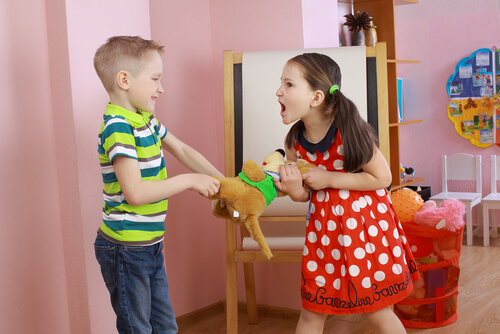How to Teach Your Children to Defend Themselves?


Reviewed and approved by the psychologist María Alejandra Castro Arbeláez
Have you taught your child that not all of the people that surround them are “good”? Your child will eventually grow up and realize for themselves that indeed there are some cruel people in the world. Have you taught your child how to defend themselves against these types of people?
Our society has developed different patterns of behavior in which good and bad people interact with each other on a daily basis.
That’s why every child should learn, to the extent possible, which people contribute to their wellbeing and which do not. This knowledge will allow them to attract positive people to their lives.
Self-defense without violence!
When we evaluate a child’s behavior in response to a quarrel or dispute, we often confuse self-defense with violence. These are two completely different concepts that have nothing to do with each other.
When the child feels physically or verbally abused, they have the right to come to the defense of their integrity and dignity.
Communication through violence is never justifiable especially when it comes to children. Keep in mind that just like in adults, tensions, disputes and fights also occur among children. These kinds of situations can have an impact on your child’s character.
Violence is the quick path, the path of the desperate, the path of those who do not know how to use better tools.
We often confuse defense with violence and these are two concepts that are completely different. Violence involves undertaking an action that seeks to harm another person. Defense on the other hand is to prevent another individual from attacking us.

Violence is an attitude that seeks to harm another individual while self-defense seeks to preserve one’s own well-being, without necessarily seeking to harm others.
In order to prevent your child from having difficulties when it comes to communicating with others, teach them basic values and the fact that violence should never be an option.
How to teach your child to defend themselves?
- Encourage the child to try to understand the other person’s motives. They should be able to see things objectively. This will help them resolve conflicts without the use of violence.
- Teach them that the offenses of others don’t matter if they aren’t true. The important thing is to have confidence in oneself and not to give importance to what others say about us.
- Prevent your child from applying the same cruelty they may receive to others. This isn’t the way to gain respect nor to make healthy bonds.
- Let them know that violence is never a solution. Violence always brings consequences. Avoiding encouraging aggressive behavior since it only contributes to instilling the wrong values in them.
- They should never run away. However, you should teach them to avoid conflict to the extent possible.
- Allow the child to express their feelings and emotions freely without judgement. It’s important for parents to listen to their children. This allows them to vent and release stress. In addition, allow them to express themselves freely. This promotes the establishment of stronger bonds.
Parents sometimes give little importance to what their children are saying when they express their feelings. We must remember that their problems carry a lot of relevance to them. That’s why it’s important for parents to listen to them carefully.

If your child defends themselves and the aggressor persists, you should teach them to ask for help from an adult. This should be done in order to solve the conflict and to apply the necessary corrective measures. Your child shouldn’t be physically assaulted under any circumstances.
You must help your child understand that they will earn a lot more by being understanding and empathetic rather than being violent.
When the situation requires the intervention of an adult, you’ll see that if you teach the aggressor with kindness and respect, they will understand why they shouldn’t continue bothering others in order to feel better about themselves.
The simple fact of being treated with kindness will make the aggressor question their attitude and put the brakes on their negative behavior.
By speaking to the child they will be able to understand that violence isn’t the right way to call for attention. Violence shows lack of self-control and affective capabilities.
Some parents choose to enroll their children in sports and other extracurricular activities in order to help them develop the strength to face certain threats including bullies.
Martial arts may be chosen, however, we recommend for them to partake in activities in which they can learn to defend themselves without using violence. They can practice sports such as volleyball, basketball, tennis and soccer.
All of these sports have both “attack” and “defense” strategies that will help the child to better manage conflict.
This text is provided for informational purposes only and does not replace consultation with a professional. If in doubt, consult your specialist.
